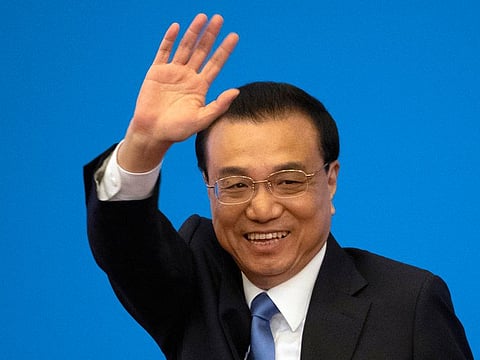Former Chinese premier Li Keqiang dies at 68
A career bureaucrat who spoke fluent English, he voiced support for economic reforms

Beijing: Former Chinese premier Li Keqiang, a reform-minded bureaucrat once tipped as the country’s future leader only to be eclipsed by President Xi Jinping, died Friday. He was 68.
He had a heart attack on Thursday and passed away in Shanghai just after midnight, state-run news agency Xinhua said.
China’s foreign ministry said it “deeply” mourned Li’s “tragic passing”.
“An obituary will be published soon,” ministry spokesperson Mao Ning said.
During his 10-year tenure as premier under Xi, Li cultivated an image as a more modern official compared to his stiffer colleagues.
A career bureaucrat who spoke fluent English, he voiced support for economic reforms during his time in office.
The son of a minor party official in eastern China’s poor Anhui province, Li was sent to the countryside to work as a labourer during the tumultuous Cultural Revolution of 1966 to 1976.
He went on to gain a law degree from Peking University, where classmates say he embraced Western liberal political theory.
But he became more orthodox after joining the ranks of officialdom in the mid-1980s, working as a bureaucrat while his former classmates protested in 1989.
Li rose to become the ruling Communist Party’s top official in Henan province, and in Liaoning in the northeast - both of which saw economic growth.
But his reputation was damaged by his handling of an HIV/AIDS epidemic stemming from a tainted blood donation programme while he was party boss in Henan.
Appointed premier in 2013, his attempts at tackling China’s deep economic challenges were curtailed by the overwhelming authority of Xi, with whom he was once seen as a rival for the country’s leadership.
Praised for helping to steer the country through the global financial crisis relatively unscathed, his time in office saw a shift in power from the more consensus-based rule associated with former leaders to the more concentrated power of Xi.
“People always debated whether (China’s) institutions would... determine the outcomes, as opposed to just raw power,” Victor Shih, an expert on China’s elite politics at the University of California San Diego, told AFP.
“Recent events show that raw power still matters more.”
“It’s very unfortunate that he didn’t have a protege to carry on his policies,” City University of Hong Kong’s Wang Jiangyu said.
‘Derailed agenda’
Li’s tenure also saw China’s economy begin to slow from the dizzying heights experienced in the 1990s and 2000s.
“He always struck me as very committed to China’s development, intellectually curious, with a highly sophisticated understanding of the Chinese economy,” Bert Hofman, director of the East Asian Institute at the National University of Singapore, told AFP.
“Events derailed some of his agenda in the past 10 years, but his thinking is still very much relevant today.”
Former Peking University classmate Guoguang Wu, now a senior research scholar at Stanford, told AFP that Li “was someone with an ability for independent thought” during their time together.
“Afterwards, he became a government official, and this ability seemed to disappear,” he said.
“I don’t believe he has left a political legacy. History will soon forget him.”
Another former classmate was more charitable, saying Li’s life and career were a testament to the success of the reform agenda he espoused during his life.
“Without reform and opening up... he and I still might have been farming in the countryside of Anhui,” lawyer Tao Jingzhou told AFP.
Sign up for the Daily Briefing
Get the latest news and updates straight to your inbox



